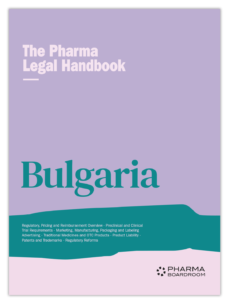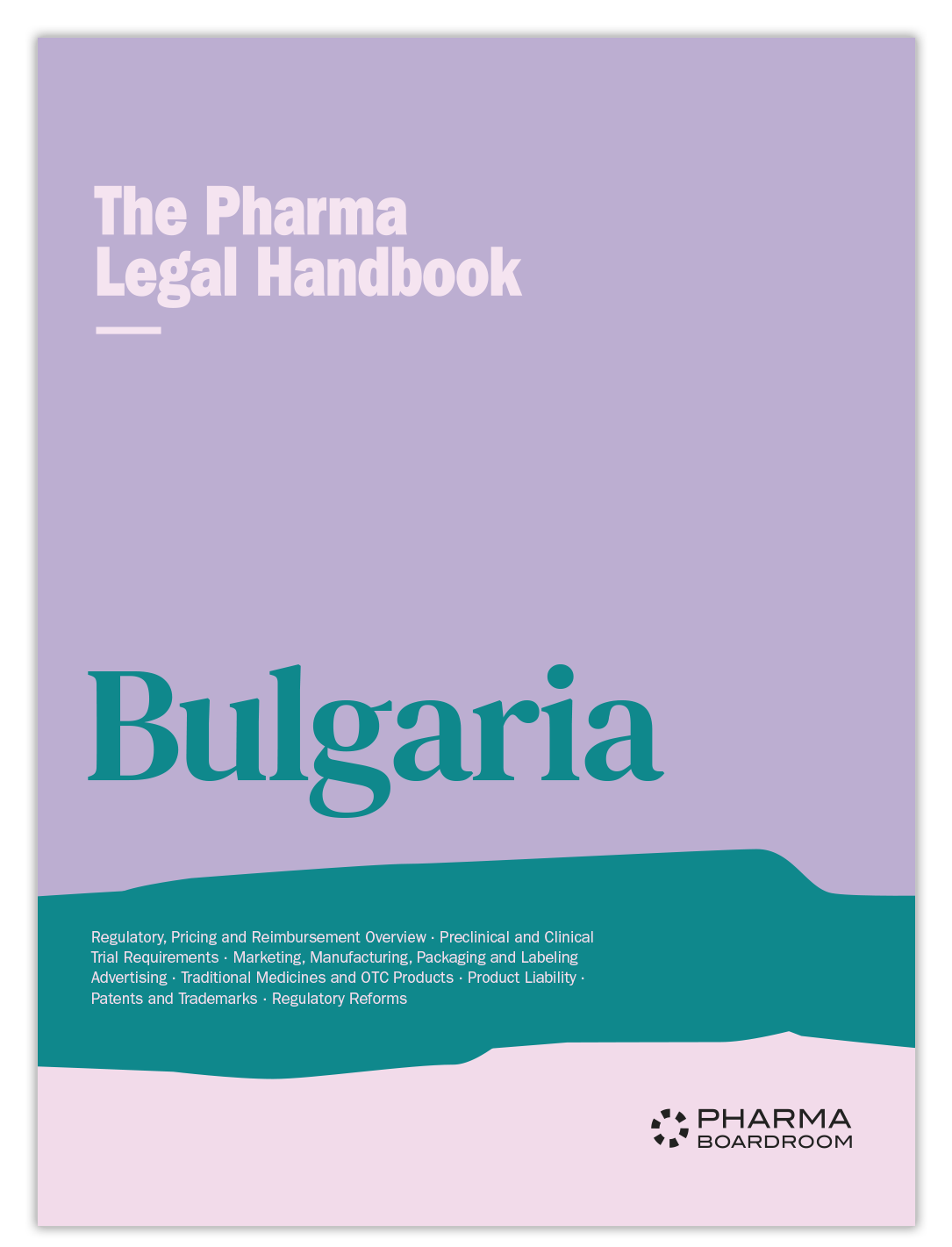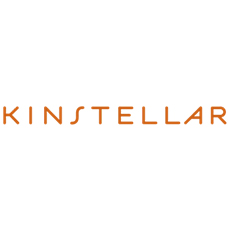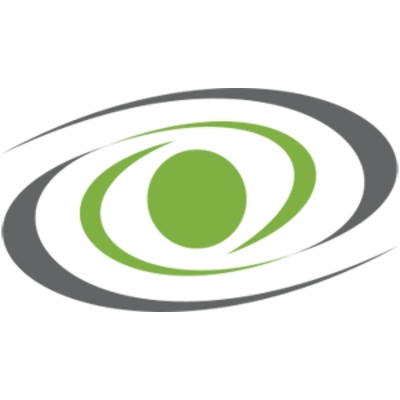The Pharma Legal Handbook: Bulgaria
 The Pharma Legal Handbook: Bulgaria answers essential questions about the legal and regulatory environment for pharmaceuticals in Bulgaria. It is a must-have for any company operating in the country or looking to enter the market.
The Pharma Legal Handbook: Bulgaria answers essential questions about the legal and regulatory environment for pharmaceuticals in Bulgaria. It is a must-have for any company operating in the country or looking to enter the market.
Prepared in association with regional pharmaceutical consultancy PharmDedict and Kinstellar, a leading independent law firm focused on emerging Europe and Central Asia, it should answer any questions linked to regulation, pricing, clinical and preclinical trials, marketing, manufacturing, trademarks and patents.
August 2019
1. Biosimilars & Biologics: Bulgaria
All legal aspects surrounding localization in Bulgaria. Prepared in association with Kinstellar and PharmDedict, this is an extract from The Pharma Legal Handbook: Bulgaria, available to purchase here for GBP 75.
1. Are biosimilar medicines considered the same as generic medicines in your country?
In order to be considered generic biosimilar medicines shall fulfill the requirements for categorizing a product as generic, namely: Generic medicinal product shall be a medicinal product of the same qualitative and quantitative composition in terms of its active substances and of the same pharmaceutical form as its reference medicinal product (e.g. the biological product), and its bioequivalence with the reference medicinal product has been substantiated through suitable bioavailability tests.
If the biosimilar medicine could not be considered generic, the latter would be categorised as new active substance.
2. Are all biologic medicines, including biosimilar medicines, patentable in your country?
In order to be patentable in Bulgaria, a biological medicine shall be new, have an inventive step and be industrially applicable. A biosimilar medicine may also be patentable, to the extent it meets the above general requirements.
3. Is there a specific regulatory framework for the marketing authorization of biosimilar medicines in your country? If yes, what is the regulatory framework for the authorization of biosimilar medicines?
The general rules and procedures of the MPHMA and Ordinance No. 27 of 15.06.2007 on the requirements to the data and documentation for authorisation for use and registration of medicinal products (“Ordinance No. 27”) for marketing authorisation of medicinal products apply also to biosimilar medicines. In case the biosimilar medicine meets the criteria for a generic drug (please see p.1 above), the process may be shorter, as the presentation of pre-clinical and clinical study results is not required, if the so-called “data exclusivity” period has expired. However, where a biosimilar medicinal product does not meet the requirements for qualification as a generic medicinal product, due to a difference in the manufacturing process or to different starting materials compared to the reference product, or due to any other reasons, the applicant has to submit to the Bulgarian Drugs Agency the results from the required pre-clinical and/or clinical trials associated with those requirements.
4. What kind of data package is needed to obtain approval for a biosimilar drug? Is this any different to the requirements for the original Biologics drug?
Please see p. 3 above.
5. What are the requirements for the choice of the reference comparator product?
By choosing the reference comparator products the existence of bioequivalence and bioavailability should be assessed.
According to the MPHMA bioequivalence shall be deemed present where medicinal products are pharmaceutically equivalent or pharmaceutical alternatives, and where their bioavailability after administration in the same molar dose is similar to the extent that their effect in terms of efficacy and safety is substantively similar.
Bioavailability is the speed and level at which the active substance or its therapeutically active part are absorbed from the pharmaceutical form and become available at the location of activity. When the medicinal substance is intended to have a systemic therapeutic effect, bioavailability shall mean the speed and level at which the medicinal substance or its therapeutically active part are released from the pharmaceutical form and pass into the general circulation.
The existence of bioequivalence and bioavailability is assessed through clinical trials.
6. Can the comparator product be sourced from another regulatory jurisdiction? If yes, what are the data needed to support this approach?
The comparator product may be sourced from another Member State. In such case the Bulgarian Drug Agency requests from the regulatory body of the Member State, where the reference product is authorised, information about the product’s market authorisation, the quantitative and qualitative composition of the reference product and, if necessary, additional documentation.
7. How are the prices of biosimilar medicines regulated? Is this any different from the requirements for the original Biologics drug?
There are no special rules for regulation of the prices of biological or biosimilar products. In general, after its market authorisation the National Council on Prices and Reimbursement of Medicinal Products (“NCPRMP”) regulates the price of a medicinal product depending on its designation:
- To be used only upon medical prescription;
- To be used without medical prescription as OTC product;
- To be covered by state funds through its inclusion in the Positive Drug List (“PDL”).
In Bulgaria at current date biosimilar and biological products have received market authorisation and price regulation as products to be used upon medical prescription and products covered by state funds through their inclusion in the PDL.
8. What is the reimbursement policy for biosimilar medicine? Is this any different from the requirements for the original Biologic drug?
In order to be included in the PDL and reimbursed, a biosimilar medicine should have a manufacturer price that does not exceed 70% of the price of the originator reference product (if the biosimilar product meets the criteria for a generic product) or 80% of the price of the originator reference product (if the biosimilar product does not meet the criteria for a generic product).
9. Does biosimilar competition impact the reimbursement policy of the originator reference products?
So far, biosimilar competition did not have any material impact on the reimbursement policy of the originator reference products.
10. What is the legal framework for biosimilar medicines prescribing (clinical decision maker) and dispensing (pharmacy level, hospital or retail)? Is this any different to the requirements for the original Biologics drug?
There is no special legal framework regulating biosimilar and biological medicines prescription and dispensing. The general legal framework applicable to prescription and dispensing of medicinal products applies also to biosimilar and biological medicines.
11. Is the system considering physician-led switching and/or pharmacy-level substitution (without involvement of the clinical decision maker)?
Prescription of biological and biosimilar products may be done by trade name rather than by international non-proprietary name. Changes to the treatment may be done only by the clinical decision maker. Where the prescription contains the specific trade name of the product (which may be the case of biological and biosimilar products), pharmacies are obliged to dispense the specific product and may not provide substitutes.
12. What are the post – authorisation requirements (including pharmacovigilance, risk management plans, post-approval studies) for biosimilar medicines? Is this any different to the requirements for the original Biologics drug?
There are no special post – authorisation requirements for biosimilar and biological products.
As a general rule, after the authorisation the BDA may request the holder of the authorisation to conduct post-marketing study for the product’s safety or efficiency, if there are concerns or lack information with regard thereto.
Any changes with regard to the product occurring post-authorisation should be approved by the BDA.
13. Are there specific policies and requirements for labelling biosimilar medicines in the event of second medical use patents? Is this any different from the requirements for the original Biologic drug?
No special policies and requirements with regard to biosimilar and biological products labelling have been introduced under Bulgarian law.
14. Have there been any significant legal/judicial developments in relation to biosimilars in your country? (Including but not limited to IP, procurement, competition, misleading information campaign, access to reference comparator product)
No significant legal/judicial developments in relation to biosimilars have been introduced in Bulgaria.
15. Are there proposals for reform or significant change to the legal, regulatory, procurement of biosimilars? If yes, when are they likely to come into force?
No proposals for reform or significant change to the regulation of biosimilars in Bulgaria have been introduced.
Also from this Legal Handbook
2. Localization: Bulgaria
All legal aspects surrounding localization in Bulgaria. Prepared in association with Kinstellar and PharmDedict, this is an extract from The Pharma Legal Handbook: Bulgaria, available to purchase here for GBP 75.
1. Are there any rules or regulations requiring and/or encouraging localization in your country? What is the legal framework defining these localization rules and policies?
Under the general regulation for encouraging investment initiatives in Bulgaria and provision of support thereof contained in the Investment Promotion Act (“the IPA”), subject to certain conditions, persons investing in Bulgaria could benefit from certain incentives such as administrative burden relief, simplified procedures for acquiring assets, tax relief, state aid, institutional support, etc. However, these are not specifically focused on the pharmaceutical and medical sector.
As a member of the European Union, Bulgaria has to ensure free movement of goods, capital and people and equal treatment of economic operators within the Union. To this end, as a general rule under the Medicinal Products in Human Medicine Act (“the MPHMA”) production, import and sale and holding of marketing authorization of medicinal products could be performed by natural or legal persons domiciled in Bulgaria or another Member State. These activities are restricted for natural or legal persons domiciled outside of the European Economic Area.
Localization rules for marketing of products in Bulgaria require certain information or documents to be provided in the Bulgarian language. In particular, the information on the packaging and the leaflet of a medicinal product has to be provided in Bulgarian, although additional languages can also be used.
2. Have there been any recent significant changes involving localization rules? If yes, when did they take place and what did they involve?
No recent significant changes have been adopted.
3. Is the process of obtaining a marketing authorization impacted by localization policies in your country? If yes, how so (what are the incentives received or the requirements)?
As mentioned above under p. 1, in order to be approved for trading of medicinal products on the territory of Bulgaria, a natural or legal person shall be registered in Bulgaria or a Member State. Only medicinal products whose holder of the authorization for use/certificate of registration is established on the territory of Bulgaria or a Member State may be released on the Bulgarian market. Other than that, there are no specific requirements or incentives for localization vis-à-vis the marketing authorization process.
4. Is the pricing process for pharmaceutical products impacted by localization policies in your country? If yes, how so (what are the incentives received or the requirements)?
As only medicinal products whose holder of the marketing authorization/certificate of registration is established on the territory of Bulgaria or a Member State may be released on the Bulgarian market, the National Council on Prices and Reimbursement of Medicinal Products is authorised to approve the price of medicinal products produced in Bulgaria or a Member State. Prices of medicinal products produced in third countries could be approved, only if traded by natural or legal persons registered in a Member State.
No incentives are envisaged with regard to the pricing of medicinal products produced in Bulgaria.
5. Is the reimbursement of pharmaceutical products impacted by localization policies in your country? If yes, how so (what are the incentives received or the requirements)?
Only medicinal products with marketing authorization may be reimbursed. Thus, only medicinal products whose marketing authorisation holder is a natural or legal person domiciled in Bulgaria or another Member State are covered by the reimbursement legal framework.
No incentives are envisaged with regard to the reimbursement of medicinal products produced in Bulgaria.
6. Is the access to public or public tenders of pharmaceutical products impacted by localization policies in your country? If yes, how so (what are the incentives received or the requirements)?
As a general rule under the Public Procurement Act, which is applicable to public tenders of pharmaceutical products, any Bulgarian or foreign natural or legal person or their associations, as well as any other entity authorized to perform supplies or services in accordance with the law of the country of registration, may participate as a candidate or a participant in a public procurement procedure in Bulgaria.
However, according to the MPHMA, as mentioned above under p. 1, in practice candidates or participants in public tenders of pharmaceutical products may be producers, wholesalers or importers registered in Bulgaria or a Member State authorized to carry out the said activities on the territory of Bulgaria.
7. Are import tariffs, importation and/or exportation permits, trade and/or taxation of pharmaceutical products impacted by localization policies in your country? If yes, how so?
Please see above p. 1.
8. Are there any other incentives or advantages offered by the current local localization rules in your country? If yes, what are they?
No other incentives provided.
9. Are there discussions about the possibility of implementing localization policies in your country? If yes, what are the proposed reforms and when should they come into place?
No discussions are being held.
Also from this Legal Handbook
3. Orphan Drugs & Rare Diseases: Bulgaria
Keen to learn more about orphan drugs & rare diseases in Bulgaria? Read on! Prepared in association with Kinstellar and PharmDedict, this is an extract from The Pharma Legal Handbook: Bulgaria, available to purchase here for GBP 75.
1. What is the definition of Rare Diseases in your country?
Under the Medicinal Products in Human Medicine Act (“MPHMA”), a “rare diseases” is defined as a disease characterized by an incidence not higher than 5 per 10,000 individuals.
2. Does the designation of ‘Orphan Drug’ exist in your country? (Does it correspond with the definition of Rare Diseases?)
The term “Orphan Drug” is reflected under Bulgarian law as “A medicinal product intended for treatment, prevention and diagnosis of rare diseases”. According to the MPHMA, these are products which:
- are intended for the diagnosis, prevention or treatment of life-threatening diseases or chronic diseases with a progressive course affecting no more than 5 out of 10,000 people on the territory of the country, or
- are intended for the diagnosis, prevention or treatment of life-threatening diseases and of chronic conditions that seriously damage health (diseases with a high share of disease-related inability to work and disability), evidence being attached that the sale of the product does not provide a satisfactory level of return that would justify the required investment in scientific research and development operations without further incentives for the author of the product, and
- when there is no satisfactory method for diagnosis, prevention or treatment of the respective condition or, if one exists, the proposed medicinal product has significantly more advantages the existing method and it is of significantly bigger benefit for the those affected by the said condition.
3. What is the regulatory framework for the authorization of an Orphan Drug? (Is this regulatory framework based on Rare Disease status or can it alternatively be based on Orphan Drug foreign status?)
There is no specific procedure for authorisation of Orphan Drugs in Bulgaria and for authorisation of such products the MPHMA refers to (i) Regulation (EC) No 141/2000 of the European Parliament and of the Council of 16 December 1999 on orphan medicinal products (the “Orphan Drugs Regulation”) for the designation of a product as an Orphan Drug; and (ii) Regulation (EC) No 726/2004 of the European Parliament and of the Council1 (“Regulation (EC) 726/2004”) regarding the marketing authorisation of Orphan Drugs.
More specifically, in order to be marketed in Bulgaria, an Orphan Drug shall have received a market authorisation by the European Medicines Agency (“EMA”) through a centralised procedure under Regulation (EC) 726/2004.
4. Does your country have provisions for relaxed clinical trial/scientific evidence requirements in respect of Orphan Drugs as compared to other drugs?
There are no provisions for relaxed clinical trial/scientific evidence requirements in respect of Orphan Drugs effective in Bulgaria.
5. Is there an expedited pathway for Orphan Drugs?
EMA has implemented an adaptive pathways approach for authorisation of Orphan Drugs. The adaptive pathways approach is a scientific concept for medicine development and data generation which allows for early and progressive patient access to a medicine.
The adaptive pathways approach is based on three principles:
- iterative development, which either means:
- approval in stages, beginning with a restricted patient population then expanding to wider patient populations;
- confirming the benefit-risk balance of a product, following a conditional approval based on early data (using surrogate endpoints) considered predictive of important clinical outcomes;
- gathering evidence through real-life use to supplement clinical trial data;
- early involvement of patients and health-technology-assessment bodies in discussions on a medicine’s development.
6. Are foreign marketing authorizations recognized in your jurisdiction for Orphan Drugs? If yes, marketing authorizations from which countries are recognized?
In general, any Orphan Drug that has received market authorization by the EMA would also be recognized in Bulgaria. This, means that Orphan Drugs from each Member State may receive market authorization in Bulgaria. There is no separate register for the Orphan Drugs authorised in Bulgaria.
7. Can Orphan Drugs be reimbursed? If so, is there a specific reimbursement procedure for Orphan Drugs?
There is no specific procedure for reimbursement of Orphan Drugs in Bulgaria.
As a general rule, the reimbursement status of a medicinal product is determined by the National Council on Prices and Reimbursement of Medicinal Products (“NCPRMP”).
In order to be reimbursed a medicinal product (including an Orphan Drug) has to be included in the Positive Drug List (“PDL”) by the NCPRMP.
Only medicinal products which have received market authorisation may be included in the PDL. The medicinal products included in the PDL receive a ceiling price defined by the NCPRMP. Another requirement is the product to be reimbursed by a public health insurance fund in at least five of the following countries: Belgium, Greece, Estonia, Latvia, Lithuania, Poland, Portugal, Romania, Slovakia, Denmark, Italy, Slovenia, Hungary, France, Finland, Czech Republic, Spain. The above requirement applies also for Orphan Drugs with the specific that it may not only be reimbursed by a public health insurance fund but also paid by with other public funds.
The medicinal product should also be suitable for the respective disease (rare disease). Assessment on certain aspects of the medicinal products is also conducted such as effectiveness, efficiency, safety, pharmaco-economic parameters, effect on budget.
The medicinal products included in the PDL are paid with public funds.
8. How are the prices of Orphan Drugs regulated?
The prices of medicinal products included in the PDL, including Orphan Drugs, are regulated by the NCPRMP.
The price of the medicinal products included in the PDL is defined on the basis of the following elements:
- Manufacturer price;
- Wholesale price;
- Retail price;
- Value added tax;
- Reference prices and margins.
9. In case of reference price based on a basket of countries, what countries are included?
Please see above p. 7 above.
10. Have there been any significant legal/judicial developments in relation to Orphan Drugs in your country?
No significant legal/judicial developments in relation to Orphan Drugs have been introduced in Bulgaria.
11. Are there proposals for reform or significant change to the regulation of Orphan Drugs? If yes, when are they likely to come into force?
No proposals for reform or significant change to the regulation of Orphan Drugs in Bulgaria have been introduced.
—————————————————–
- Regulation (EC) No 726/2004 of the European Parliament and of the Council of 31 March 2004 laying down Community procedures for the authorisation and supervision of medicinal products for human and veterinary use and establishing a European Medicines Agency
Also from this Legal Handbook
4. Cannabinoid Drugs, Medicinal Cannabis and Opioid Drugs: Bulgaria
The key facts about the cannabinoids drugs in Bulgaria. Prepared in association with Kinstellar and PharmDedict, this is an extract from The Pharma Legal Handbook: Bulgaria, available to purchase here for GBP 75.
Cannabinoid Drugs
1. Are Cannabinoid Drugs authorized in your country?
Pursuant to the Narcotic Substances and Their Precursors Act and secondary legislation for its implementation, Cannabis, as well as Cannabinoid Drugs, are classified in Bulgaria as plants constituting high risk to public health due to the harmful effect of their abuse. As a general principle the growing, import and trade of Cannabis and Cannabinoid Drugs are prohibited under Bulgarian law.
However, there are several explicit exclusions of the above prohibition, where:
- Cannabis, containing less than 0,2% by weight of tetrahydrocannabinol (THC) could be grown, imported and traded for exhaustively listed purposes under the provisions of Ordinance No. 1 of 12.03.2018 1 of the Minister of agriculture, foods and forestry (“Ordinance No. 1”);
- limited quantities of Cannabis are used for medical, scientific or laboratory research, for educational purposes, as well as for maintaining the ability of dogs uncovering narcotic substances with maximum quantity allowed of 30 grams of THC or 30,000 grams of hemp.
Currently in Bulgaria the production of Cannabinoid Drugs and Products, containing Cannabidiol (CBD) is not permitted. However, as there is no explicit prohibition for the import of products, containing CBD, such as cosmetics, essential oils, food supplements, etc., CBD containing products could be found on the Bulgarian market.
1.Grow and sale of Cannabinoid Drugs, containing less than 0,2% by weight of THC
Under fulfilment of strict requirements (e.g. lack of criminal history in connection with drugs and/or their analogues for natural persons, registration for seed production for the purpose of animal feed) and after receiving permit by the Ministry of Agriculture, Food and Forestry (“the MAFF”) individuals and legal entities who are registered farmers are permitted to grow and sale Cannabis containing less than 0,2% by weight of THC, intended for:
- (i) fiber;
- (ii) animal feed and food seeds;
- (iii) seeds for sowing.
2. Purchase of Cannabis, containing less than 0,2% by weight of THC
The following categories natural and legal persons are permitted to purchase the said Cannabis or the production obtained from the cultivation thereof:
- Cannabis Stem processors and / or fiber producers, where the obtained production is purchased for the purpose of fiber production;
- natural and legal persons registered under the terms of the Animal Feed Act, where the seeds are purchased with intention for animal feed usage;
- natural and legal persons registered according to the procedure of the Food Act, where the seeds purchased with intention for food usage;
- natural and legal persons who have obtained permission for growing Cannabis containing less than 0,2% by weight of THC and have been registered under the Sowing and Planting Material Act, where the seeds are purchased with intention for usage as sowing material.
3. Cannabis limited usage
Usage of limited quantities of Cannabis for medical, scientific or laboratory research, for educational purposes, as well as for maintaining the ability of dogs uncovering narcotic substances is subject to licencing procedure.
Permit for these activities may be issued to:
- persons who are entitled to carry out expert, research and educational activity, medical or scientific research, whereby the premises in which the said quantities of Cannabis are used for medical, scientific or laboratory research, for educational purposes shall fulfil certain requirements;
- employees of the specialized services, research and scientific institutes of the Ministry of Internal Affairs (“the MIA”);
- employees of the Customs Agency;
- employees in the Directorate-General for Execution of Punishments and its territorial offices for the purpose of maintaining the ability of dogs uncovering narcotic substances.
4. Cannabis seeds import not intended for sowing may be performed only by legal entities and sole traders, cooperatives and registered producers or civil societies for animal feed trading with the respective licence. The licence is issued by the MAFF.
2. What are the regulatory authorities with jurisdiction over Cannabinoid Drugs?
The following authorities have jurisdiction over Cannabinoid Drugs:
- the MAFF is competent for issuance of permit for growing, importing and trading Cannabis, containing less than 0,2% by weight of THC, and exercising control over the production of and trading with the plants;
- the MIA, the Minister of Health (“the MH”), the Minister of Justice (“the MJ”) and the Director of Customs Agency are competent for issuance of permits for usage of limited quantities of Cannabis for medical, scientific or laboratory research, for educational purposes, as well as for maintaining the ability of dogs uncovering narcotic substances;
- the Agricultural Regional Directorates, the Executive Agency of Variety Testing Field Inspection and Seed Control and the Bulgarian Food Safety Agency are competent for exercising control over the cultivation and trading of the Cannabis;
- the MIA through its specialized departments and the State Agency for National Security is competent for prevention, detection and countering crimes related to the illegal traffic of narcotic drugs and precursors, including Cannabinoid Drugs;
- the MH is competent for exercising control over the production, processing, import, export, transit, trade, storage, reporting, transfer, transportation, use and advertising of the plants and narcotic substances and drugs, including Cannabinoid Drugs, as well as on the treatment of drug addicts;
- the Ministry of Finance (“the MF”), through the customs administration, is competent for exercising control over the import, export and transit from and to third countries of narcotic drugs and precursors and performs activities to prevent and detect their illegal traffic;
- the National Council on Narcotic Substances (“the NCNS”) for conducting and implementing the national policy on drug abuse, as well as the fight against drug trafficking.
3. Is there a specific regulatory framework for the authorization pricing, and reimbursement of Cannabinoid Drugs?
The legal framework for authorization of Cannabinoid Drugs includes the following legal acts:
- Narcotic Substances and Their Precursors Act (“NSTPA”);
- Medicinal Products in Human Medicine Act (“MPHMA”);
- Ordinance on the Rules for Classification of Plants and Substances as Narcotic;
- Ordinance on the Rules and Procedure for Permitting the Activities under Art. 73(1) of the NSPA;
- Ordinance No. 1;
- Criminal Code.
The general legal framework regulating authorization, pricing and reimbursement of medicinal products in general is the MPHMA. However, as Cannabinoid Drugs are still not permitted for usage in human medicine in Bulgaria, there is no specific regulation on authorization, pricing and reimbursement of Cannabinoid Drugs.
4. Which are the Cannabinoid Drugs that have received market approval to date?
In Bulgaria no Cannabinoid Drugs have received market approval to this date.
5. Who can prescribe Cannabinoid Drugs?
As mentioned above, since the usage of Cannabinoid Drugs for medicinal purposes is not permitted in Bulgaria, medicinal products containing such ingredients could not be prescribed.
6. Is there a list of doctors authorized to prescribe Cannabinoid Drugs?
N/A, please see above p. 5.
7. What approvals or notifications are required to prescribe Cannabinoid Drugs?
N/A, please see above p. 5.
8. Which organizations are authorized to sell/distribute Cannabinoid Drugs available?
- As mentioned above THC containing products could be traded by the persons under p. 1.1. above.
- At current date, there are no authorization requirements for sale/distribution of CBD containing products.
9. Is there a list of retailers/ distributors authorized to sell Cannabinoid Drugs?
The MAFF maintains a registry of the persons authorized to grow and sell THC containing products. There is no such list for persons who import and sell CBD containing products.
10. Are there proposals for reform or significant change to the regulation of Cannabinoid Drugs?
Since 2018, when the growing, import and production of THC containing products was first regulated in more detail, no further amendments and supplementations have been adopted.
However, due to a recent decision of the European Court of Justice stating that CBD derived from the entire hemp plant is not a narcotic and is therefore subject to EU law on the free movement of goods among member states, and the subsequent decision of the EU Commission for recategorizing CBD containing foods, gives us a reason to believe that a future development in the EU and national legal framework may be expected.
11. When are they likely to come into force?
N/A, please see above p. 10.
Medicinal Cannabis
12. Is Medicinal Cannabis authorized in the country?
In Bulgaria the usage of Medicinal Cannabis is prohibited.
13. What are the regulatory authorities with jurisdiction over Medicinal Cannabis?
The following authorities have jurisdiction over medicinal Cannabis:
- MIA through its specialized departments and the State Agency for National Security competent for prevention, detection and countering crimes related to the illegal traffic of narcotic drugs and precursors;
- MH competent for exercising control over the production, processing, import, export, transit, trade, storage, reporting, transfer, transportation, use and advertising of the plants and narcotic substances and drugs, as well as on the treatment of drug addicts;
- MF, through the customs administration, for exercising control over the import, export and transit from and to third countries of narcotic drugs and precursors and performs activities to prevent and detect their illegal traffic;
- NCNS for conducting and implementing the national policy on drug abuse, as well as the fight against drug trafficking.
14. What is the regulatory framework for the authorization, pricing, and reimbursement of Medicinal Cannabis?
As the Medicinal Cannabis is not permitted for usage in Bulgaria, there is no regulatory framework on the authorization, pricing, and reimbursement thereof.
15. How is the production and import of Medicinal Cannabis regulated and by which agencies/authorities?
N/A, please see above p. 12 and p. 14.
16. What approval or notifications are necessary to produce or import Medicinal Cannabis?
N/A, please see above p. 12 and p. 14.
17. What is the regulatory framework for the marketing and distribution of Medicinal Cannabis?
N/A, please see above p. 79.
18. How can patients obtain Medicinal Cannabis?
N/A, please see above p. 12.
19. Who can prescribe Medicinal Cannabis?
N/A, please see above p. 12.
20. Is there a list of doctors authorized to prescribe Medicinal Cannabis?
N/A, please see above p. 12.
21. What approvals or notifications are required to prescribe Medicinal Cannabis?
N/A, please see above p. 12.
22. Where is Medicinal Cannabis available?
N/A, please see above p. 12.
23. Is there a list of retailers authorized to sell Medicinal Cannabis?
N/A, please see above p. 12.
24. Are there proposals for reform or significant change to the regulation of Medicinal Cannabis?
Since 2018, when the growing, import and production of THC containing products was regulated, no new further amendments and supplementations have been adopted. There have been some public discussions on the legalization of Medicine Cannabis, but no specific steps have been taken on behalf of the government towards adoption of new legal acts in that sphere.
Opioid Drugs
25. Are Opioid Drugs authorized in your country?
As a general rule under Bulgarian legal framework Opium production in Bulgaria is prohibited.
- However, certain types of Opioid Drugs could be used for treatment of Opioid addiction, namely: (i) Morphine Sulphate; (ii) Methadone Hydrochloride; (iii) Buprenorphine Hydrochloride.
These medicinal products are permitted to be used for treatment only in certain substances, namely: (i) caps. prolong. 120 mg, 200 mg of Morphine Sulphate; (ii) solution 10 mg/ml of Methadone Hydrochloride; (iii) sublingual tablets – 2 mg, 4 mg, 8 mg of Buprenorphine Hydrochloride. - Other Opioid Drugs such as Morphine, Oxycodone, Remifentanil, Tilidine, Tramadol, Tramadol, Xanax, Diazepam, etc. (hereinafter referred to as Other Opioid Drugrs) are used for overcoming severe pain of different origins and treatment of anxiety, mixed anxiety-depressive states or depression associated with other diseases, and treatment of panic disorders. These medicinal products are available with a doctor’s prescription.
26. What are the regulatory authorities with jurisdiction over Opioid Drugs?
The following authorities have jurisdiction over Opioid Drugs and Other Opioid Drugs:
- MH is competent for monitoring compliance with the storage, release, recordkeeping and reporting requirements for medicinal products used in the programs for and issuance of permits for conducting treatment of Opioid addiction;
- the National Focus Centre in the Field of Drugs and Drug Addictions competent for exercising control over the performance of the programs and maintaining a registry of the individuals enrolled in the programs for Opioid Drugs addiction treatment;
- NCPRMP with the competences as listed above under p.3.
- MIA through its specialized departments and the State Agency for National Security for prevention, detection and countering crimes related to the illegal traffic of narcotic drugs and precursors;
- NCNS for conducting and implementing the national policy on drug abuse, as well as the fight against drug trafficking.
27. Is there a specific regulatory framework for the authorization, pricing, and reimbursement of Opioid Drugs?
The legal framework for authorization of Opioid Drugs and Other Opioid Drugs includes the following legal acts:
- NSTPA;
- MPHMA;
- Ordinance on the Rules for Classification of Plants and Substances as Narcotic;
- Ordinance No. 2 of 20 June 2012 on the terms and conditions of implementing programmes for treatment with agonists and agonist-antagonists of Opioid-addicted persons which regulates the treatment of this population of patients (“Ordinance No. 2”);
- Ordinance No. 34 of 25 November 2005 on the procedure for payment by the state budget of the treatment of Bulgarian citizens for diseases outside the scope of compulsory health insurance (“Ordinance No. 34”);
- Ordinance on the Terms, Rules and Procedure for Regulation and Registration of Prices for Medicinal Products;
- Criminal Code.
Please note that there are no separate acts regulating the pricing and reimbursement of Opioid Drugs and Other Opioid Drugs, whereby the Ordinance on the Terms, Rules and Procedure for Regulation and Registration of Prices for Medicinal Products shall apply.
Ordinance No. 2 and Ordinance No. 34 regulate the sale and purchase of Morphine Sulphate, Methadone Hydrochloride and Buprenorphine Hydrochloride used for Opioid addiction treatment. Methadone Hydrochloride is purchased by the State and shall be provided upon request of the facilities under p. 29.1. below by the MH. These facilities could apply for state aid for the purchase of Morphine Sulphate and Buprenorphine Hydrochloride.
The NCPRMP has approved the whole sale and retail price of Other Opioid Drugs. These products could also be approved for reimbursement.
28. Which are the Opioid Drugs that have received market approval to date?
Morphine Sulphate, Methadone Hydrochloride and Buprenorphine Hydro-chloride are approved for marketing. Morphine Sulphate and Buprenorphine Hydrochloride could be sold/distributed only by the traders under p. 32.1. below and used by the facilities under p. 29.1. below. Methadone Hydro-chloride is provided by the MH.
Other Opioid Drugs are medicinal products, which have received market approval and are available with a doctor’s prescription.
There are specific rules on the labelling and advertising of these products. Direct and indirect advertising of Opioid Drugs and Other Opioid Drugs, as well as medicinal products, containing those, is strictly forbidden.
29. Who can prescribe Opioid Drugs?
- Opioid Drugs under p. 25.1. above could be used in treatment of Opioid addiction performed by individual psychiatric care practices, group psychiatric care practices, medical centres and diagnostic consultative centres, where a doctor with a recognized specialty in psychiatry practices, mental health centre and hospital care facility, providing psychiatric help.
- Other Opioid Drugs could be prescribed by any medical doctor authorized to provide healthcare services.
30. Is there a list of doctors authorized to prescribe Opioid Drugs?
- There is a registry of the facilities approved for conducting treatment programs of Opioid addiction individuals maintained by the MH.
- Other Opioid Drugs could be prescribed by any medical doctor authorized to provide healthcare services, whereby there is no specific list of the doctors authorized to prescribe it.
31. What approvals or notifications are required to prescribe Opioid Drugs?
- Facilities as listed above under p. 29.1. applying for permission for conducting programs for treatment of Opioid addiction before the MH shall fulfil several requirements, including to have (i) treatment program; (ii) plan, indicators and procedures for evaluating the effectiveness of the program; (iii) Instructions for performing activities with Medicinal Opioid Drugs; (iv) qualification of the experts responsible for managing the program; (v) security system, etc. The Opioid Drugs under p. 29.1. are prescribed by doctors practicing in these facilities.
- Other Opioid Drugs could be prescribed by any medical doctor authorized to provide healthcare services.
32. Which organizations are authorized to sell/distribute Opioid Drugs available?
- Morphine Sulphate and Buprenorphine Hydrochloride could be purchased only from wholesale traders licensed for wholesale of medicinal products containing narcotic substances by the MH under fulfilment of the requirements of MPHMA. Methadone Hydrochloride is purchased by the State and shall be provided upon request of the facilities under p. 29.1. above by the MH.
- Other Opioid Drugs could be sold/distributed by (i) wholesale traders licensed for wholesale of medicinal products containing narcotic substances by the MH under fulfilment of the requirements of MPHMA; (ii) pharmacies licensed for retail of products containing narcotic substances by the Ministry of Health under fulfilment of the requirements of MPHMA.
33. Is there a list of retailers/distributors authorized to sell Opioid Drugs?
There is a public register of the wholesalers and retailers licensed to sell/distribute medicinal products containing narcotic substances, which is maintained by the MH. There is no separate register of those licensed for Opioid Drugs and Other Opioid Drugs sell/distribution.
34. Are there proposals for reform or significant change to the regulation of Opioid Drugs?
To date there are no proposals for reform or significant change to the regulation of Opioid Drugs and/or Other Opioid Drugs.
35. When are they likely to come into force?
N/A, please see above p. 34.
————————————————–
- Ordinance No. 1 of 12.03.2018 on the terms and conditions for the issuing of a permit for the cultivation of plants such as Cannabis for fibre, seeds for animal feed and food and seed for sowing, containing less than 0,2% by weight of THC, as defined in the leaf, petal and fruit tips, for trade and control
Also from this Legal Handbook
5. Regulatory Reforms: Bulgaria
The low-down on the situation regarding regulatory reforms in Bulgaria. Prepared in association with Kinstellar and PharmDedict, this is an extract from The Pharma Legal Handbook: Bulgaria, available to purchase here for GBP 75.
1. Are there proposals for reform or significant change to the healthcare system?
The topic of changing the existing healthcare system has been thoroughly debated in Bulgaria. In the final quarter of 2018, the Bulgarian minister of healthcare proposed two alternative models (“Model A” and “Model B”) to fight the inefficiencies of the current system. Both models entail the apportion of a more significant role to private health insurers.
Model A essentially envisages the de-monopolization of the National Health Insurance Fund (the “NHIF”) and immediate competition between private health insurers. It is meant to enable insured individuals to choose between insurers for the purposes of the mandatory health security. The NHIF would, however, continue its operation in competition with the private actors. Model A further entails that insured persons could transfer the payment of their premiums directly to the new health insurance provider of their choice. In case of insolvency, the NHIF or another fund would step in to cover the servicing of the insured persons.
Model B envisages that the solidarity model currently in place in Bulgaria would be transformed into a more personalized health security model. The NHIF would be gradually demonopolized. Model B would essentially be comprised of three pillars: (i) mandatory health security (8%); (ii) mandatory additional health security with a fixed premium amounting to a small sum; and (iii) voluntary health security. In this case, the NHIF would cover the treatment fees to a certain threshold, and the rest would be covered by the patient.
2. When are they likely to come into force?
There is certain scepticism in Bulgaria about the prospects of the healthcare system changing in the near future. However, the goal is for the new system to be introduced by the end of 2019 or in 2020.
Click the following links to read more legal articles from Bulgaria:
- Regulatory Pricing and Reimbursement Overview
- Preclinical and Clinical Trial Requirements
- Marketing, Manufacturing, Packaging & Labeling, Advertising
- Traditional Medicines and OTC Products
- Product Liability
- Patents & Trademarks
- Regulatory Reforms






